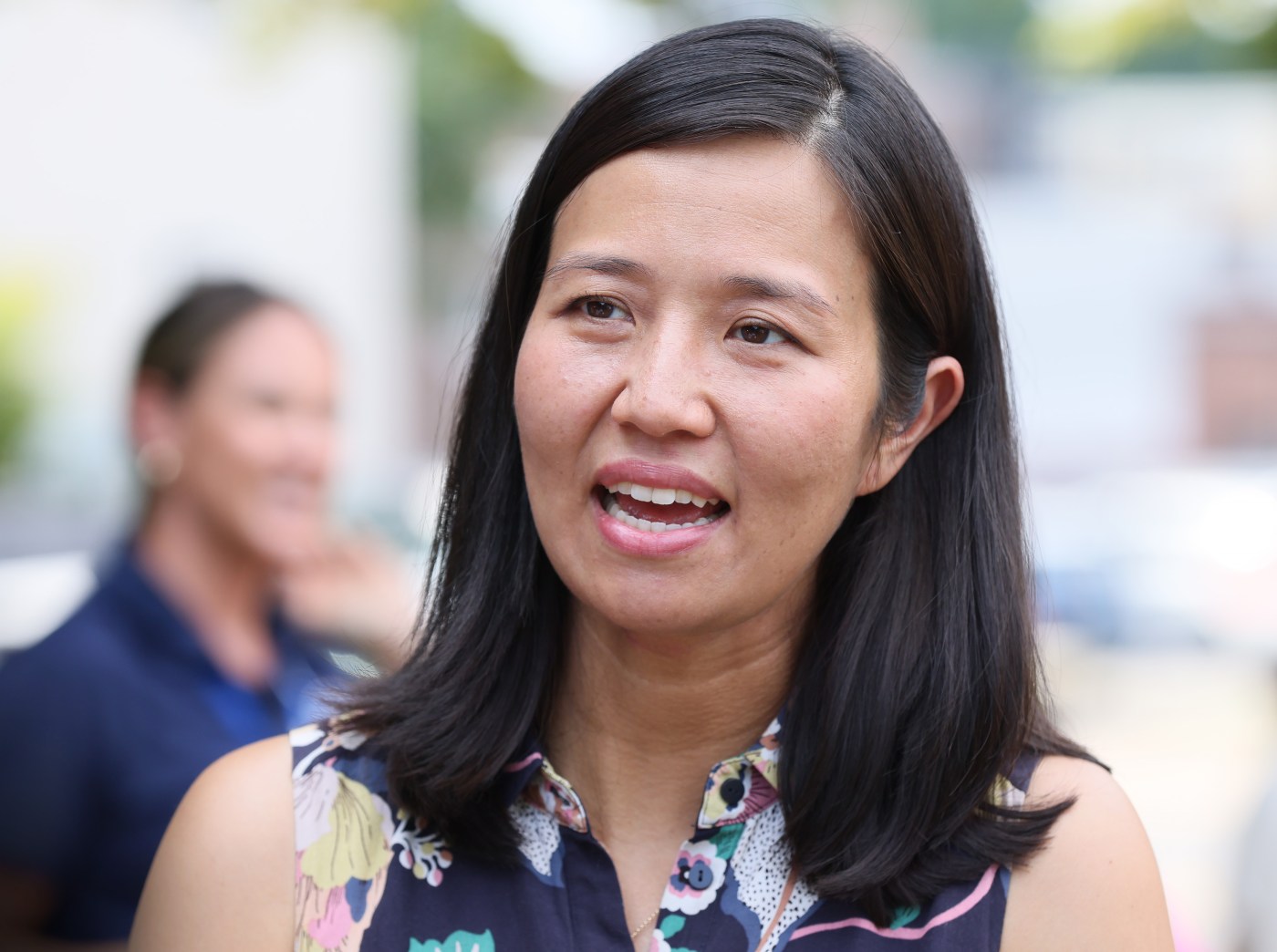
Boston Mayor Wu rescinds Summer Street bus lane that wasn’t working ‘as intended’ in bustling Seaport
The Wu administration plans to remove a bus lane on Summer Street that runs through South Boston, citing data from a six-month pilot that showed it wasn’t working as intended, largely because cars were illegally using it more than buses.
The City of Boston Streets cabinet released a report Friday outlining the decision, as part of an analysis of the “Summer Street Bus/Truck Lane Pilot program,” launched in December 2023 as a way for the city and MBTA to test potential changes and reconfigurations to Summer Street, which officials say “cannot support the Seaport’s continued economic growth and vitality,” as it exists today.
“We measured congestion and learned that the corridor can support a reallocation of road space and a reduction in general vehicle lanes without dramatically worsening travel times,” Chief of Streets Jascha Franklin-Hodge wrote in the report. “However, the data and feedback also demonstrated that the dedicated bus lane did not adequately serve its intended purpose.”
Franklin-Hodge said the roughly mile-long bus lane between South Station at Dorchester Avenue and East First Street, while intended to move people along more efficiently, did not markedly improve bus speed and was not actually used very often by buses, due to infrequent service on the current MBTA route, No. 7, that runs through the area.
It was used more by other vehicles seeking to cut through traffic, an occurrence that Franklin-Hodge said was exacerbated by the city’s use of temporary materials and signage to construct and denote the new bus lane, and a lack of enforcement of the new traffic rules.
“The effectiveness of the bus/truck lane was hindered by lack of compliance from general traffic,” the report states. “Some drivers reported confusion in interpreting new striping and signage, particularly when turning right onto Summer Street. Others deliberately ignored the rules, largely without consequence.”
The results of a Summer Street Pilot survey garnered responses from 2,500 people, who, in “many cases,” shared their “frustrations with blocked bus lanes, crosswalks and congestion,” Franklin-Hodge wrote in the report.
The data revealed, therefore, that the new lane resulted in “marginal benefit for bus riders,” per the report, and the city will begin work to remove it this fall, and complete it by the end of winter construction, Franklin-Hodge told the Herald.
The pilot project was paid for by city funds, at a budgeted cost of $700,000, a spokesperson for the Streets cabinet said.
While the bus lane didn’t work, Franklin-Hodge noted that the city plans to keep the “successful safety improvements such as pedestrian-friendly signals and bike lanes.”
All-day bike ridership increased by 43% during the pilot period, for example, and there was a 73% decrease in extreme speeding, defined in the report as vehicles traveling more than 40 mph in the corridor.
The city also plans to revisit a bus lane on Summer Street in the future, when service is increased via the MBTA’s plans to overhaul its bus network over the next five years, beginning in December, as part of its bus network redesign project, Franklin-Hodge said.
Part of the changes will include converting the 7 bus route that runs through the area to a high frequency line, which will extend the current route including by connecting it to other major transit hubs, and expand it to a 7-day a week service, compared to today’s service, which doesn’t run on Sundays, he told the Herald.
He pointed to other places where bus lanes have worked thus far in the city, such as a center-running lane on Columbus Avenue that officials plan to extend and an ambitious plan to add center-running bus lanes to a three-mile corridor on Blue Hill Avenue, as reasons for revisiting a future Summer Street bus lane.
Related Articles
Coalition forms to ’embolden and inspire’ Boston city councilor considering mayoral bid
Boston School Committee signs off on White Stadium redevelopment negotiations over community protest
Boston city councilors press for state intervention after ‘dismal’ BPS bus transportation delays
Boston gets economic boost via 225 new liquor licenses after Gov. Healey signs bill
Recent gun violence prompts Boston city councilor to request more police in Dorchester, Mattapan
Franklin-Hodge also cited the need to make changes to the Summer Street corridor to support the continued economic growth and development in the Seaport, which he said may become “impossible” to sustain without reconfigurations aimed at moving people and goods along more safely and efficiently in the limited space.
“This is a corridor that has always been a congested place at its peak,” Franklin-Hodge said. “We know that if we don’t find a way to move more people with the road that we have, that we are ultimately going to make it impossible for this area of the Seaport to continue to grow.”
While the city didn’t see “significant benefit to the existing bus service” in the pilot, he said, it learned about “bus priority can work in this corridor,” and what conditions need to be met in order for “it to be successful.”
“We believe we’ve laid the groundwork for a future revisit of this idea,” Franklin-Hodge said, “so that as the corridor grows, we can do it with a major new transit spine, instead of just adding congestion to an already congested roadway. So, that’s really the core of the ‘why’ behind the pilot in the first place.”

